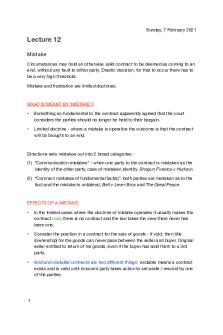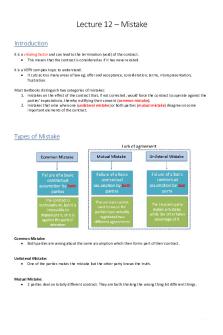2. Cross-purpose mistake notes PDF

| Title | 2. Cross-purpose mistake notes |
|---|---|
| Course | Elements of Contract Law |
| Institution | Queen Mary University of London |
| Pages | 2 |
| File Size | 73.2 KB |
| File Type | |
| Total Downloads | 85 |
| Total Views | 159 |
Summary
Cross purpose mistake...
Description
Cross-purposes mistake
Define -
One or both parties may argue that the contract exists, on their own term. However, from an objective interpretation it is impossible to resolve the ambiguity over what was agreed, so that the only possible conclusion that there is no contract.
Requirements Contract so ambiguous, no agreement is ever reached:
Raffles v Wichelhas 1864 -
two ships named the peerless one left from bombay and the other ship called peerless left in december contract only specified the peerless so the parties did not agree one party thought it was october peerless other thought it was december
Scriven Bros v Hindley 1913
Two lots taken from the cargo of a single ship were put up for sale by an auction. Catalogue did not reveal that one was hemp and the other was tow. But inspection would have revealed this. The lots carried the same shipping marks, when it should have been different because they were different cargoes. Buyers bid for both lots, having inspected the hemp, but not the tow. They mistakenly believed that both were hemp. Sellers brought an action against the buyers to recover the price of the two. The buyers alleged that they had not agreed to buy the tow and a mistake has been made.
-
Held - Courts allowed D to avoid the contract on the basis that there had been no agreement. - Both parties’ interpretations were equally plausible in an objective sense. - A reasonable person in the position of the D buyers would reasonably have concluded that the lots being sold with the same shipping marks were the same.
The objective test The courts ask whether one party’s interpretation is more reasonable than others.
Smith Hughes
v
-
P offered to sell oats to D. On deliver it was discovered that the oats were new and thus of no use to D, who required old oats. D refused to pay claiming that the contract was void for mistake.
Held - On an objective assessment there was symmetry between what was offered and what was accepted, so the contract should be upheld....
Similar Free PDFs

2. Cross-purpose mistake notes
- 2 Pages

Mistake - Lecture notes 3
- 3 Pages

Mistake - exam notes
- 7 Pages

Mistake
- 4 Pages

3.0 Case Notes on Mistake
- 29 Pages

Lecture notes, Mistake of Fact
- 5 Pages

(12) Mistake - Lecture notes 12
- 8 Pages

Mistake Tutorial
- 4 Pages

MISTAKE OF LAW VS MISTAKE OF FACT
- 14 Pages

Mistake and frustation
- 20 Pages

Honest and reasonable mistake
- 24 Pages

IRAC - Common Mistake
- 5 Pages

Mistake - Exam summary
- 5 Pages

Mistake - Summary Contract Law
- 6 Pages
Popular Institutions
- Tinajero National High School - Annex
- Politeknik Caltex Riau
- Yokohama City University
- SGT University
- University of Al-Qadisiyah
- Divine Word College of Vigan
- Techniek College Rotterdam
- Universidade de Santiago
- Universiti Teknologi MARA Cawangan Johor Kampus Pasir Gudang
- Poltekkes Kemenkes Yogyakarta
- Baguio City National High School
- Colegio san marcos
- preparatoria uno
- Centro de Bachillerato Tecnológico Industrial y de Servicios No. 107
- Dalian Maritime University
- Quang Trung Secondary School
- Colegio Tecnológico en Informática
- Corporación Regional de Educación Superior
- Grupo CEDVA
- Dar Al Uloom University
- Centro de Estudios Preuniversitarios de la Universidad Nacional de Ingeniería
- 上智大学
- Aakash International School, Nuna Majara
- San Felipe Neri Catholic School
- Kang Chiao International School - New Taipei City
- Misamis Occidental National High School
- Institución Educativa Escuela Normal Juan Ladrilleros
- Kolehiyo ng Pantukan
- Batanes State College
- Instituto Continental
- Sekolah Menengah Kejuruan Kesehatan Kaltara (Tarakan)
- Colegio de La Inmaculada Concepcion - Cebu

